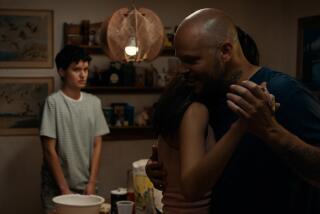It all adds up in Eric Rohmer’s magical ‘A Summer’s Tale’
- Share via
Eric Rohmer’s “A Summer’s Tale” got lost in the shuffle 18 years ago.
The witty, delicate romantic comedy about an indecisive young man and the three women in his life, written and directed by the renowned New Wave French filmmaker of “My Night at Maud’s” and “Claire’s Knee,” opened in Europe in 1996 after premiering at the Cannes Film Festival.
But “A Summer’s Tale,” the third in the filmmaker’s “Tales of Four Seasons” series of comedies, never was released in the United States. Thanks to the distribution company Big World Pictures, American audiences finally are getting an opportunity to see the movie.
The newly restored “Summer’s Tale” opened last month to enthusiastic reviews in New York and arrives in Los Angeles on Friday.
Melvil Poupaud stars as Gaspard, a recent university math graduate and a budding musician, who arrives at a beautiful seaside resort in Brittany for a summer’s vacation before he is to start a new job.
Moody and absolutely clueless when it comes to affairs of the heart, he hopes that his fickle girlfriend, Lena (Aurelia Nolin), will join him at the resort. While he plays the waiting game, Gaspard becomes friends with Margot (Amanda Langlet), a level-headed ethnology graduate working as a waitress, who encourages him to romance her friend Solene (Gwenaëlle Simon).
“I believe there is something special about this film — the light, the dialogue, those young girls talking about love and this poor Gaspard in the middle,” said Poupaud, 41, by email. “It is very French, but the feeling of youth that Eric’s movies give is universal.”
Jonathan Howell, president of Big World, described the picture as “the ideal anti-blockbuster, a highly intelligent film, but one that offers the sensuous pleasure of four attractive people and a gorgeously rendered seaside.” Howell didn’t know how “A Summer’s Tale” slipped through the distribution cracks.
“That’s still a mystery in spite of my effort to find out,” said the longtime Rohmer fan, who saw the film on the festival circuit in the U.S. about 14 years ago. “I can only assume that the company holding the rights didn’t find an offer that they liked in the U.S.”
Rohmer, who died in 2010 at age 89, was known for his perceptive, albeit dense, studies of relationships and love.
“I think of Rohmer as the pioneer of the ‘talking film,’” Howell said. “His characters discuss, discuss and then discuss some more — but always on the topics of universal interest, such as love, relationships, philosophy, psychology and everything in between. You can see his influence on such filmmakers as Hong Sang-soo, Richard Linklater and Noah Baumbach.”
Rohmer was notable for the respect with which he treated his female characters, Howell added, “usually showing them to be the more sensible and perceptive sex, as opposed to his demonstrably fallible — and often egotistical — male characters.”
Poupaud came recommended to Rohmer by actress Arielle Dombasle, who had worked with the filmmaker on 1983’s “Pauline at the Beach.”
“Eric wanted someone who was also a musician,” Poupaud said. “Arielle knew I played guitar. That helped me get the part. Eric didn’t see me in any films but knew I started working with [director] Raúl Ruiz as a child. Eric had great respect for Raúl’s work. As soon as we met, I felt his iron blue eyes checking me out, and I knew he saw his character within me.”
The popular actor, whose work includes the 2008 film “A Christmas Tale” and the 2007 film “Broken English,” described working with the director as a mixture of a “holiday feeling and extremely concentrated work.”
With a small crew of six, “Eric would prepare his shoot for years, scouting himself all the locations, studying the weather, the tides, the dates of arrivals of tourists — very important as all the people you see on the beach were real people, no extras,” Poupaud said. “There was no call sheet, no assistant, no catering. Eric would do everything himself, even the sandwiches.”
Once the camera was rolling, Poupaud said everyone was focused. “Eric didn’t want to do more than one take,” he said. “His method was to over-prepare and then wait for some magical incident to happen.”
Over the years, Poupaud said, a lot of young men — “not only French ones” — have said they identify with Gaspard.
“He’s a very complicated young man,” Poupaud said. “He is obsessed with the man-woman relationship but really doesn’t get it. But what saves him from being the average boring, romantic Frenchman is that he shares all his doubts and fears with us. He is very truthful, honest and does not try to be someone else.”
Twitter: @mymackie
More to Read
Only good movies
Get the Indie Focus newsletter, Mark Olsen's weekly guide to the world of cinema.
You may occasionally receive promotional content from the Los Angeles Times.











